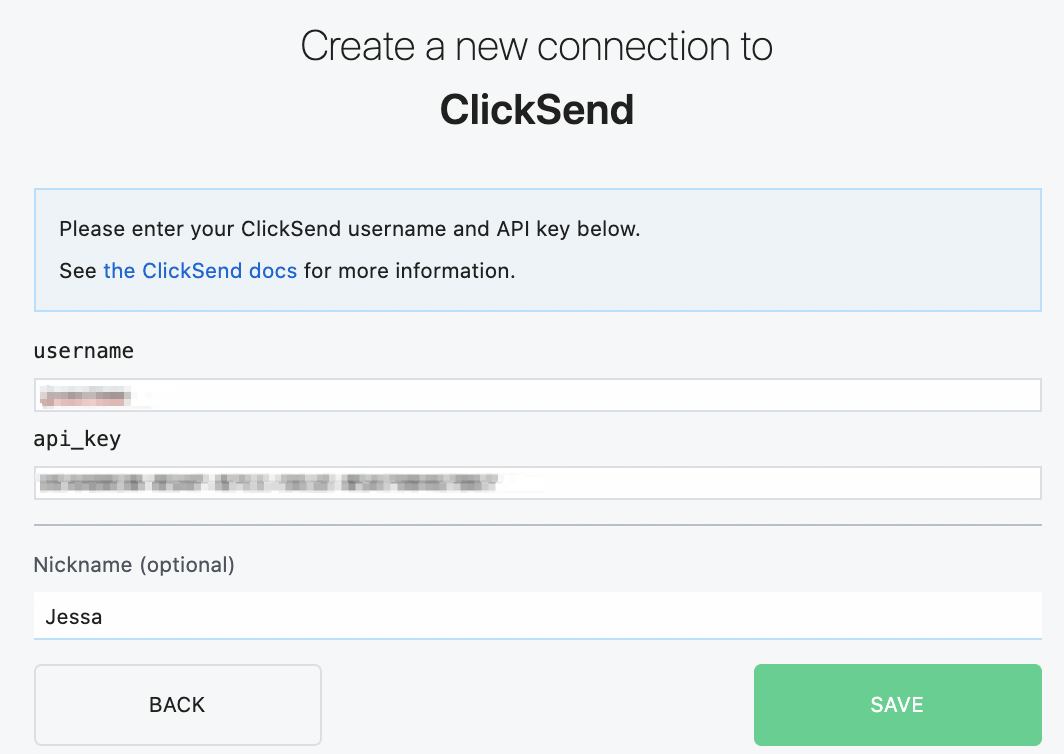What do you want to automate
with ClickSend SMS and Notion?
Prompt, edit and deploy AI agents that connect to ClickSend SMS, Notion and 3,000+ other apps in seconds.
Trusted by 1,000,000+ developers from startups to Fortune 500 companies
Popular Ways to Connect ClickSend SMS with Notion#
Popular ClickSend SMS and Notion Triggers#
Emit new event for each new incoming SMS message received. See the documentation
Emit new event when a new voice message is received or sent. See the documentation
Emit new event when a new comment is created in a page or block. See the documentation
Emit new event when a data source is created. See the documentation
Emit new event when a page is created or updated in the selected data source. See the documentation
Popular ClickSend SMS and Notion Actions#
Creates a new contact in a specific list. See the documentation
Append new and/or existing blocks to the specified parent. See the documentation
Use this action to finalize a mode=multi_part file upload after all of the parts have been sent successfully. See the documentation
Sends a new MMS to one or multiple recipients. See the documentation
Create a comment in a page or existing discussion thread. See the documentation
Overview of ClickSend SMS#
The ClickSend SMS API unlocks the potential to integrate robust messaging capabilities into your workflows. With Pipedream, you can not only send SMS messages programmatically but also automate notifications, streamline communication based on events, and much more. Whether you're confirming orders, alerting staff, or engaging with customers, ClickSend and Pipedream make these tasks seamless.
Connect ClickSend SMS#
import { axios } from "@pipedream/platform"
export default defineComponent({
props: {
clicksend: {
type: "app",
app: "clicksend",
}
},
async run({steps, $}) {
return await axios($, {
url: `https://rest.clicksend.com/v3/account`,
auth: {
username: `${this.clicksend.$auth.username}`,
password: `${this.clicksend.$auth.api_key}`,
},
})
},
})
Overview of Notion#
Notion's API allows for the creation, reading, updating, and deleting of pages, databases, and their contents within Notion. Using Pipedream's platform, you can build workflows that connect Notion with various other services to automate tasks such as content management, task tracking, and data synchronization. With Pipedream's serverless execution, you can trigger these workflows on a schedule, or by external events from other services, without managing any infrastructure.
Connect Notion#
import { axios } from "@pipedream/platform"
export default defineComponent({
props: {
notion: {
type: "app",
app: "notion",
}
},
async run({steps, $}) {
return await axios($, {
url: `https://api.notion.com/v1/users/me`,
headers: {
Authorization: `Bearer ${this.notion.$auth.oauth_access_token}`,
"Notion-Version": `2021-08-16`,
},
})
},
})
Community Posts#

